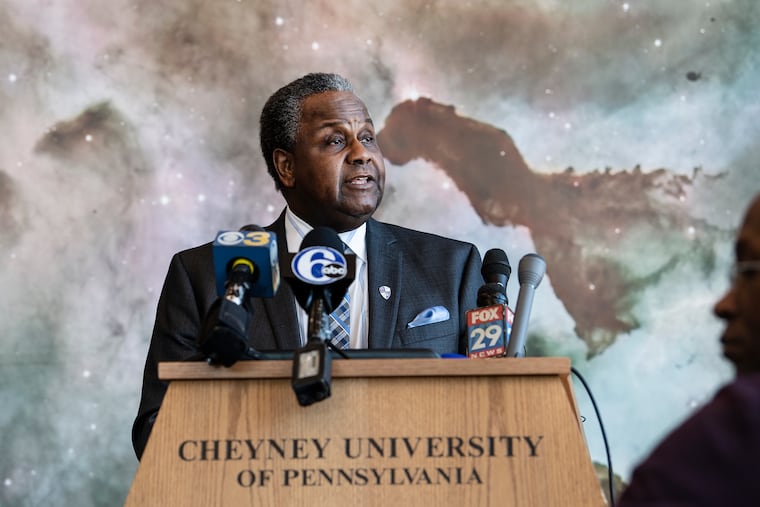Cheyney University launches fund-raising campaign; president vows to end the year with a balanced budget
Cheyney president Aaron A. Walton said plans with private partners were proceeding and that a local company, Epcot Crenshaw, planned to relocate its headquarters to Cheyney’s campus. Thomas Jefferson University, another partner, is planning to build a medical facility on campus, he said.

Despite recent concerns about Cheyney University’s accreditation and finances expressed by the head of Pennsylvania’s state system, the school’s president Tuesday announced an ambitious fund-raising campaign to help balance the budget by June 30 and vowed to work to keep the historically black university around for another 182 years.
“We will have a balanced budget,” Cheyney president Aaron A. Walton said at a news conference in the school’s science center, attended by alumni, students, and others.
Walton also said that revenue-generating plans with private partners, announced in July, were progressing and that a local company, Epcot Crenshaw, planned to relocate its headquarters to Cheyney’s campus. In the meantime, he said, the company, which focuses on the environmental impact of food production, plans to convert an existing Cheyney building into a laboratory. A greenhouse and aquaponics facility are planned, too.
Thomas Jefferson University, another partner, is planning to build a medical facility on campus, Walton said, and already has brought Cheyney faculty and students to its Center City campus for shared learning. Neither Walton nor Joseph Hill, Thomas Jefferson’s chief diversity officer, offered any details on the medical facility, noting that it was still in planning.
“We’re still having discussions around what that facility would look like,” Hill said.
Walton also said the university was in talks about building a hotel and conference center on campus, 275 acres of rolling farmland in Delaware and Chester Counties. A multipurpose building for large university gatherings that also could be used by the community is in planning, too, Walton said, as is a partnership with the national Starbucks Foundation for research.
“All these would be revenue-generating activities,” Walton said, showing a map that outlines a commercial area planned for the campus.
They also would provide internship and training opportunities for students, Walton said.
The news conference followed something of a bombshell dropped last month by Daniel Greenstein, chancellor of the Pennsylvania State System of Higher Education.
Greenstein told state senators at a budget hearing that Cheyney was likely to lose accreditation later this year and looked as if it would be short on cash again by as much as $10 million. He said the university may have to operate as an unaccredited institution, possibly offering career training.
After Greenstein and Walton met with Gov. Tom Wolf last week, Walton said all were committed to Cheyney’s future. Cheyney has struggled with finances and enrollment in recent years but has been executing a plan for transformation under Walton, who took the helm nearly two years ago.
After Walton’s remarks Tuesday, Kenn Marshall, a spokesperson for the state system, said the chancellor stands by his remarks at the Senate hearing.
“We’re going to continue to work with Cheyney and support them," Marshall said. “Obviously, President Walton has a plan and we hope it’s successful.”
Robert W. Bogle, longtime chair of Cheyney’s Council of Trustees, said after the news conference that he is more encouraged about Cheyney’s future than ever, “in spite of the negativity that the chancellor has articulated.”
Cheyney officials met on campus Tuesday with representatives of the Middle States Commission on Higher Education, which accredits the school, and Bogle said they had “a frank discussion that embraced our ability to be successful.”
“There are still challenges,” he said. “It isn’t just the immediacy of financial needs. It’s the sustainability of the institution and our ability to provide an academic environment that embraces the issues that Middle States has some concern about.”
It’s a “huge balancing act,” Bogle said, trying to cut costs and maintain educational quality.
During the news conference, Walton said he expected the university to retain its accreditation through Middle States and asserted that much of the $10 million funding hole Greenstein referenced is a cash-flow problem he expects to be resolved.
The university, however, is aiming to raise about $4 million over the next few months under a new campaign to make sure the budget is balanced.
Walton projected that enrollment would grow from just over 400 this year to nearly 700 in the fall and said the school had experienced a jump in applications of more than 30 percent. The academic quality of the students who put down deposits for next year has improved and more freshmen returned to the campus in 2018-19 than in prior years, Walton said.
Ayana Curtis, 19, a freshman from Philadelphia who attended the news conference, said the president’s words were a relief in the wake of news reports about accreditation and budget problems.
“It’s scary to be a student and hear stuff like that,” she said. “But to know that our president is so ahead of the game, to have things in place and to be working toward making sure we are here another 182 years, it’s really promising and it kind of soothes the soul.”